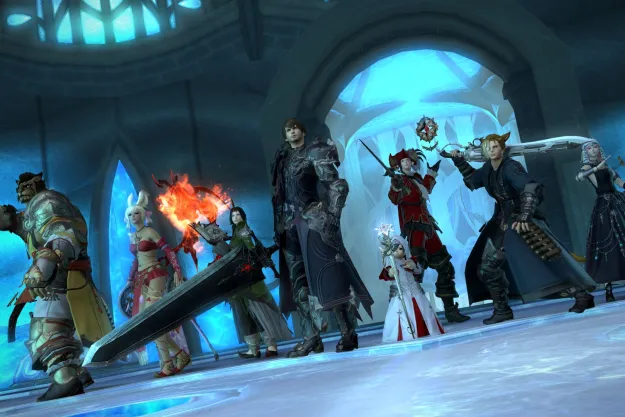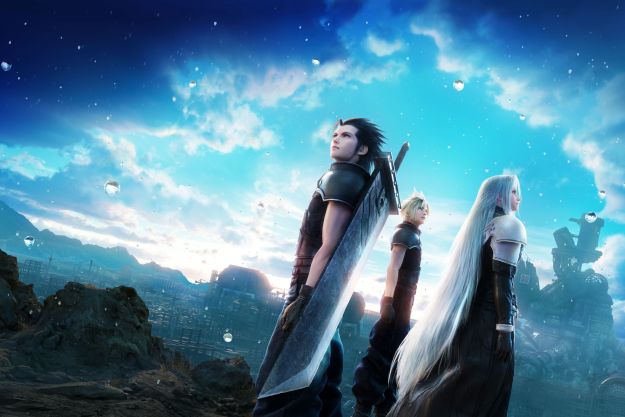It took me a while to figure out how Stranger of Paradise: Final Fantasy Origin’s darker story and blunt characters would all coalesce into a satisfying narrative. Then, within the game’s final hours, some massive twists and revelations shocked me to my core as they thematically redefined the entire experience. Nine months later, Stranger of Paradise Final Fantasy Origin still has my favorite video game ending of 2022.
As such, I had to reflect on why this ending stuck with me and learn more about its creation. To find out how it came to be, I spoke to Kazushige Nojima, the founder of Stellavista Ltd., which helped craft the story and scenario for Stranger of Paradise: Final Fantasy Origin and was the scenario writer for many other notable RPGs like Final Fantasy VII, Final Fantasy X, and Kingdom Hearts.
“I joined the team after some development had progressed, and at that point, Jack’s fate was already decided,” he explained to Digital Trends in an exclusive interview. “My job was to organize the various story elements, which at the time were in disorder, into a united pathway to the ending.”
And what an ending it was. Be warned that spoilers for Stranger of Paradise: Final Fantasy Origin are to follow in this breakdown of what made the ending so special, which features insight from a developer that helped create its bombastic narrative.
You don’t know Jack
Although Nojima admits that “the philosophy of the characters, the events that occur, and the storyline that leads up to what happens to Jack, in the end, were the result of much trial and error,” the final version of Stranger of Paradise is clever in how it sets up for a conclusion with maximum shock value. For much of the game, its plot seems fairly simple and surface-level.
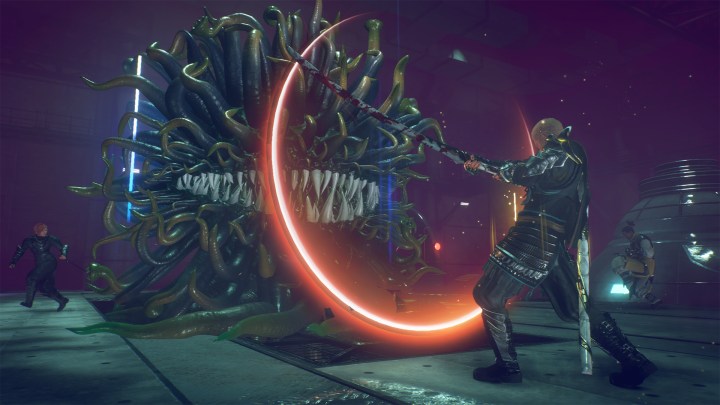
The game is about a group of heroes on a quest to restore the four Elemental Crystals around Cornelia to save the land from darkness. It’s a tale literally as old as the Final Fantasy series itself. But, something feels a bit off the whole time as many of the characters — namely the player character Jack Garland — seem laughably single-minded and stoic despite the quest they are taking part in. While this results in some moments that seem unintentionally funny for a lot of the game’s runtime, it’s all turned on its head in the game’s final hours.
Upon defeating Astos, a Dark Elf who’s been taunting players throughout the game, Jack learns he is a Stranger. Strangers are agents for a race of beings called the Lufinians, who release their darkness into the land of Cornelia and send agents to quell it; if the darkness gets too harsh or combines with emotion to become Chaos, they’ll just reset the entire world. This revelation recontextualizes Jack’s basic and bland personality as we discover he’s someone who’s had their memory wiped and brainwashed to have a single goal: defeat darkness and Chaos.
With the death of Astos, [Jack] felt a sadness which he had never before experienced.
Ahead of its release, Stranger of Paradise was subject to memes and ridicule due to how ridiculous its characters were. At this moment in the story, though, the game flips that notion on its head as we learn that they are people stuck in a cruel, endless cycle. Nojima highlighted why Astos’ death is a critical moment in Jack’s journey.
“In Cornelia, Jack had only the joys of fighting: the anger towards the enemies that blocked his path and the happiness from basking in his victories,” he explains. “His mental state was quite stable at that time; however, with the death of Astos, he felt a sadness which he had never before experienced.”
From this point onward, Jack shows more emotion, even if it’s initially just confusion and sadness, than he ever did before. And we haven’t even hit the game’s most memorable twist yet.
Betrayal
Defeating Astos releases a great darkness onto the world, and Cornelia is succumbing to it when Jack and his friends return. They do their best to try to get Princess Sarah out of the town, but she is killed. After this, a flashback reveals that she and Jack were romantically involved in a previous cycle and that Jack is actually Garland, the villain of the original Final Fantasy. When Jack is at his lowest, he’s betrayed by Jed, Ash, Neon, and Sofia, party members players have relied on for the entire game and who Jack thought were his friends.
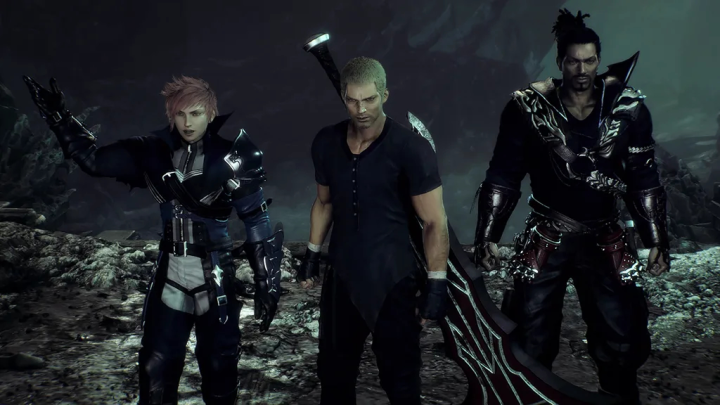
“With Sarah’s death, his sadness reached a breaking point, and the balance was lost,” Nojima says. “As a result, the Darkness Manifest arose in Jack’s soul. Ash and his friends saw this moment as a once-in-a-lifetime opportunity and took action — that’s how I see it.”
In my eyes, this moment cements that Stranger of Paradise is an antithesis of sorts to the Final Fantasy series. We’re so used to the series’ formula of warriors fighting away anything dark or chaotic that we’ve never really questioned what situations might call for some chaos. And by making an element core to almost every Final Fantasy game betray the player, the game clearly demonstrates how it’s breaking series norms.
I love how this ties into gameplay, as I was forced to battle the party members I spent so long fighting with and choosing gear for. It’s a video game twist I won’t soon forget. Although Nojima declined to comment on where Stranger of Paradise stands thematically amid the entire series, he did break down why this moment is so critical to the game’s story.
“To save Cornelia from the Darkness Manifest, there was a need to tie together a great swell of emotions — a mixture of joy, anger, sorrow, and pleasure — to darkness in order to birth Chaos, and then to use Chaos to sever the connection to Lufenia,” Nojima says. “Warriors in the armor of Chaos, so to speak, were needed, and for that, Jack, a superb warrior, was the right man for the job. Ash, Jed, and their friends understood this logic well, and at the moment Jack lost control of his emotions, they exposed themselves as enemies to trigger him to go over his limit.”
Defying expectations
Due to the intense emotion caused by his friends’ betrayal, Jack succumbs to Chaos. The story could’ve ended here and still tied into the first Final Fantasy game reasonably well, but it goes a step further. Jack directly confronts Lufinia, tired of the fact that a group of people won’t get their hands dirty as they ask people to do the same thing repeatedly for their benefit. In Nojima’s eyes, Jack’s defiance was a literal, character-driven decision.

“I keep in mind the principle that stories of people who take on a great enemy, or rise against an injustice created by immense power, cannot help but stir up some kind of emotion in the heart of the recipient,” he says.” I believe this is also reflected in Jack’s appearance as well.”
Personally, I see some more thematic depth to this moment and that idea of defiance. It feels like the game is defying the expectations that come with being a new Final Fantasy title, whether those demands be from Square Enix or the fans. Regardless of what’s being rebelled against, at its core, it’s saying to embrace your emotions and fight for what you believe in, even if that results in a little bit of chaos.
I remember feeling confident that we had a compelling story.
Jack is able to successfully defeat Darkness Manifest, defy the Lufininans, and is sent 2,000 years into the past by his friends. Here, in the game’s final moments, we learn that this was all a master plan that Jack Garland had crafted, even though he didn’t know it while doing it. He lays out why this was necessary with the game’s final line, spoken after years have passed when he resembles the version of Garland players first meet at the Chaos Shrine in the original Final Fantasy.
“Cloaked in gloom and veiled by shadow, we await that fateful day when the Warriors of Light arise. Although their glow may be faint at first, even a sputtering candle is brilliant against the black of night. And so we have but one choice … We will plunge this world into the depths of darkness.”
Finale Fantasy
This final moment is critically important to the game’s story, as it affirms that players must recontextualize their entire experience playing Stranger of Paradise. I enjoyed replaying the game and noticing small clues that something was off, like how all the levels are seemingly based on other Final Fantasy games, which could have been worlds the Lufinians reset. According to Nojima, he built the whole game around that final line to ensure it was as thematically poignant as the developers wanted it to be.
“Upon learning that the producer and director liked Jack’s line at the ending, I remember feeling confident that we had a compelling story — what was left was just how to connect it all to this line,” Nojima explains.
I do consider this story to be a prequel to the original Final Fantasy; however, it is just one possible interpretation of it.
Stranger of Paradise’s ending is so memorable because it’s when Jack ascends from being a gruff dude-bro to a clever mastermind willing to tear power structures down so the true Warriors of Light can come. The game urges its players to speak up and defy beings of power when they are unjust, even if some might see that action as questionable and chaotic. Despite that, Stranger of Paradise might be considered a villain origin story for Garland. But is Jack Garland really a villain? Nojima doesn’t think so.
“There may have been a moment where Jack could be perceived as a villain,” he says. “However, those who doubt their own righteousness cannot remain a villain. Viewed overall, I think he is a hero.”
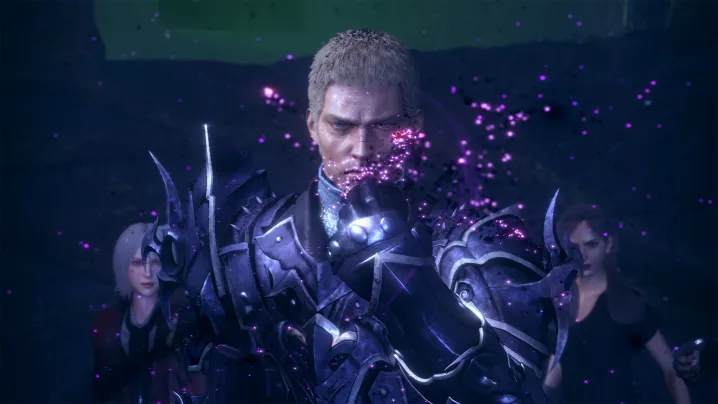
Now, just one more question about the game remains: Is Stranger of Paradise Final Fantasy Origin a prequel to Final Fantasy, or is it just supposed to be a defiant story that stands on its own? Square Enix’s messaging has been unclear, as creative producer Tetsuya Nomura told Famitsu that it’s simply a game “inspired by” that first Final Fantasy title. Nojima was much clearer on the connection.
“Yes, I do consider this story to be a prequel to the original Final Fantasy; however, it is just one possible interpretation of it,” Nojima tells Digital Trends. “If there is an opportunity, I’d like to write other interpretations as well.”
For what could’ve just been a simple origin story, Stranger of Paradise went above and beyond with this fantastic ending. Within just the last couple of hours, the game reveals a powerful, personal, and nuanced message that permeates throughout the entire game once you know what it is. For its thematic depth, ties to gameplay, and overall shock factor, Stranger of Paradise’s ending was my favorite one in a game this year.
Stranger of Paradise: Final Fantasy Origin is available now for PC, PlayStation 4, PS5, Xbox One, and Xbox Series X.
Editors' Recommendations
- In defense of Final Fantasy 7 Rebirth’s polarizing ending
- PSA: Don’t burn yourself out on Final Fantasy VII Rebirth’s open-world activities
- The most underrated Final Fantasy game is coming to PS Plus this month
- I rode a Chocobo and befriended a dolphin in Final Fantasy VII Rebirth
- Final Fantasy VII Rebirth finally launches next February



